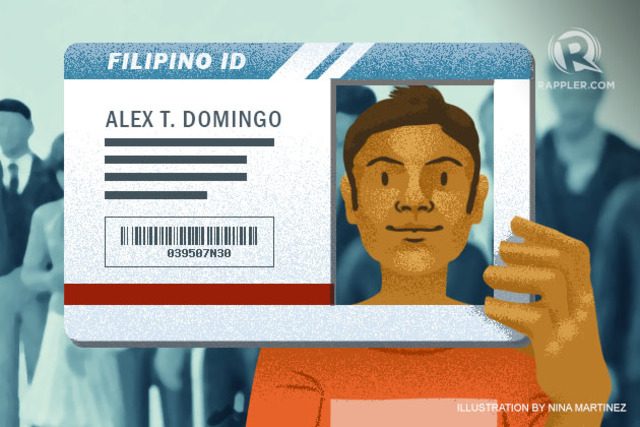SUMMARY
This is AI generated summarization, which may have errors. For context, always refer to the full article.

MANILA, Philippines – Filipinos will soon have a single and unified proof of identity to facilitate their public and private transactions, after the Senate and the House passed the bill creating the Philippine Identification System (PhilSys).
The Senate on Monday, March 19, approved Senate Bill 1738 on 3rd and final reading, with minority senators Francis Pangilinan and Risa Hontiveros opposing the measure. In September 2017, the House approved a similar measure, which had been included in the 17th Congress’ priority bills.
The bill is seen to deter criminality by instituting a single official identification for all citizens and foreign residents in the country.
Senator Panfilo Lacson, sponsor of the bill and former Philippine National Police chief, said the establishment of a National Reference System could help law enforcers deter criminality and terrorism by facilitating the processes of apprehension and prosecution.
At present, he said, there are 33 different ID cards issued by various government agencies, which lead to “duplication of efforts, wastage of resources, and uncoordinated identity approaches.
Senate version
Under the bill, an applicant would be given a PhilSys number and PhilID.
The PhilSys Number (PSN) is a randomly generated identification number for each individual, to be incorporated in all identification systems of government agencies.
PhilID is a non-transferable card with the PSN, full name, facial image, date of birth, address, and fingerprints of the bearer.
Under the proposed measure, the Philippine Statistics Authority (PSA) is the main implementer and is mandated to act as the respository and custodian of all data.
Lacson also defended the bill from critics who say it would infringe on citizens’ right to privacy and other civil liberties.
“Those who claim that the Philippine national ID system will violate the people’s right to privacy ought to know that, under the measure, only two questions are addressed: One, who are you? Two, are you who you claim to be?” Lacson said on Twitter.
Under the Senate bill, the PhilSys data would only be released under the following conditions:
- Upon the consent of the registered person, specific to the purpose prior to the processing
- Upon risk of public health and safety when relevant information may be disclosed, provided the risk of significant harm to the public is established and the owner of the information is notified within 72 hours of the fact of such disclosure
- Upon order of the court
- When a registered person requests access to his or her registered information and record history, subject to the guidelines and regulations to be issued by the PSA
Now that both chambers approved the bill, they are set to convene a bicameral conference committee to thresh out differences between their versions.
Among the main differences is the mandatory nature of the IDs. The House version requires all Filipinos 18 years old and above, living here or abroad, to register personal data for their national IDs. In the Senate version, however, such identification would not be mandatory. – Rappler.com
Add a comment
How does this make you feel?
There are no comments yet. Add your comment to start the conversation.